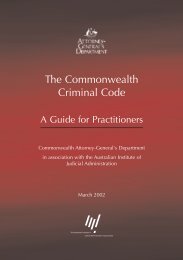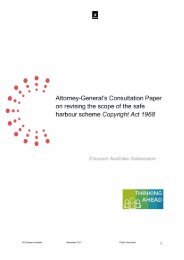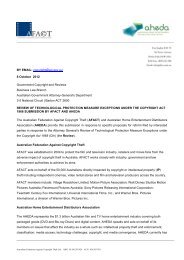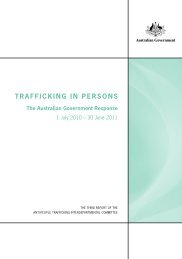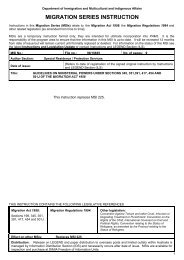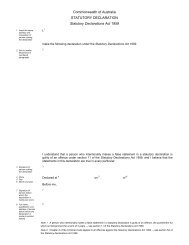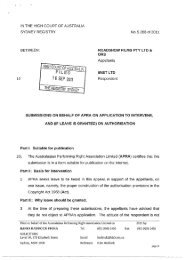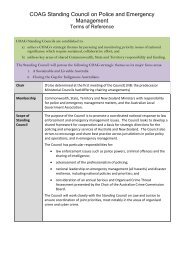Normann Witzleb [PDF 657KB] - Attorney-General's Department
Normann Witzleb [PDF 657KB] - Attorney-General's Department
Normann Witzleb [PDF 657KB] - Attorney-General's Department
You also want an ePaper? Increase the reach of your titles
YUMPU automatically turns print PDFs into web optimized ePapers that Google loves.
prove the absence of consent before the action can proceed further. 95 The ALRC<br />
regards the defence of consent as unnecessary 96 on the basis that a plaintiff who<br />
consents to the defendant’s conduct is unlikely to satisfy the elements of the cause of<br />
action, in particular that he or she had a reasonable expectation of privacy or that the<br />
act complained of was sufficiently serious to cause substantial offence to a person of<br />
ordinary sensibilities. 97 These two approaches share a common rationale: Persons<br />
should not need to defend themselves against allegations of privacy invasion if the<br />
plaintiff agreed to the very conduct complained of. Despite differing legislative<br />
techniques, both approaches are therefore likely to lead to similar outcomes in practice.<br />
They require that plaintiffs plead and, if necessary, prove facts that allow an inference<br />
that they did not give consent to the privacy encroachment.<br />
59 The VLRC goes a different way by establishing that consent is a defence to the cause<br />
of action. Creating a defence, rather than making consent an element of the cause of<br />
action, is likely to lead to different outcomes where there is an evidentiary non liquet.<br />
Just as in the context of public interest, the VLRC was concerned that requiring the<br />
plaintiff to prove a negative (i.e. the absence of consent) would impose a difficult task<br />
on them. 98 The NSWLRC acknowledges the potential difficulty but submits that the<br />
focus of the inquiry into consent should be about capacity and ‘reality’ of consent, i.e.<br />
the questions of whether the plaintiff was in a fit state to consent and the consent was,<br />
in all the circumstances, free and informed. 99<br />
Comment<br />
60 Imposing the onus of proving consent on the defendant aligns the statutory privacy<br />
action with other civil wrongs, in particular the law of trespass. In Australian and<br />
Canadian law, the onus of proving consent to trespass to the person 100 or trespass to<br />
land 101 is on the defendant. 102 It has been suggested that this approach is consistent<br />
with the significance of a person’s fundamental rights in their bodily integrity, liberty and<br />
property. 103 Where the defendant directly interferes with these interests, a prima facie<br />
violation of the plaintiff’s rights is made out. However, this argument does not translate<br />
into area of privacy, because, unlike the bodily integrity, liberty and property, our interest<br />
in privacy is not protected per se, regardless of circumstances. Whether a wrongful<br />
invasion of privacy occurred in a given case depends on a balancing of competing<br />
95 But see Leonhard, above n 92, who considers that the onus of establishing consent would be on the<br />
defendant (at 46).<br />
96 ALRC Report, at [74.174].<br />
97 Ibid, at [74.159].<br />
98 VLRC Report, at [7.154].<br />
99 NSWLRC Report, at [5.51].<br />
100 Secretary, <strong>Department</strong> of Health and Community Services v JWB (Marion’s case) (1992) 175 CLR 218;<br />
[1992] HCA 15, at 310 (McHugh J, obiter).<br />
101 Proprietors of SP 20297 v G & S Developments Pty Ltd [2008] NSWSC 257.<br />
102 This is also the position in Canada: Non-Marine Underwriters, Lloyd’s of London v Scalera [2000] 1 SCR<br />
551. In English law, it is unclear where the onus of proof is on the plaintiff (Freeman v Home Office (No 2)<br />
[1984] 2 QB (524)) or on the defendant (cf. Ashley v Chief Constable of Sussex Police [2007] 1 WLR 398,<br />
[2006] EWCA Civ 1085, at [31+: ‘open to doubt’ (Sir Anthony Clarke); not considered in Ashley v Chief<br />
Chief Constable of Sussex [2008] 1 AC 962; [2008] UKHL 25.<br />
103 Non-Marine Underwriters, Lloyd’s of London v Scalera *2000+ 1 SCR 551, at [10], [15].<br />
21


![Normann Witzleb [PDF 657KB] - Attorney-General's Department](https://img.yumpu.com/26247895/21/500x640/normann-witzleb-pdf-657kb-attorney-generals-department.jpg)

